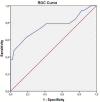Hemoglobin A1c Levels Predicts Acute Kidney Injury after Coronary Artery Bypass Surgery in Non-Diabetic Patients
- PMID: 28492788
- PMCID: PMC5409247
- DOI: 10.21470/1678-9741-2016-0010
Hemoglobin A1c Levels Predicts Acute Kidney Injury after Coronary Artery Bypass Surgery in Non-Diabetic Patients
Abstract
Introduction:: Elevated hemoglobin A1c levels in patients with diabetes mellitus have been known as a risk factor for acute kidney injury after coronary artery bypass grafting. However, the relationship between hemoglobin A1c levels in non-diabetics and acute kidney injury is under debate. We aimed to investigate the association of preoperative hemoglobin A1c levels with acute kidney injury in non-diabetic patients undergoing isolated coronary artery bypass grafting.
Methods:: 202 non-diabetic patients with normal renal function (serum creatinine <1.4 mg/dl) who underwent isolated coronary bypass were analyzed. Hemoglobin A1c level was measured at the baseline examination. Patients were separated into two groups according to preoperative Hemoglobin A1c level. Group 1 consisted of patients with preoperative HbA1c levels of < 5.6% and Group 2 consisted of patients with preoperative HbA1c levels of ≥ 5.6%. Acute kidney injury diagnosis was made by comparing baseline and postoperative serum creatinine to determine the presence of predefined significant change based on the Kidney Disease Improving Global Outcomes (KDIGO) definition.
Results:: Acute kidney injury occurred in 19 (10.5%) patients after surgery. The incidence of acute kidney injury was 3.6% in Group 1 and 16.7% in Group 2. Elevated baseline hemoglobin A1c level was found to be associated with acute kidney injury (P=0.0001). None of the patients became hemodialysis dependent. The cut off value for acute kidney injury in our group of patients was 5.75%.
Conclusion:: Our findings suggest that, in non-diabetics, elevated preoperative hemoglobin A1c level may be associated with acute kidney injury in patients undergoing coronary artery bypass grafting. Prospective randomized studies in larger groups are needed to confirm these results.
Conflict of interest statement
No conflict of interest.
Figures


Similar articles
-
Acute kidney injury based on KDIGO (Kidney Disease Improving Global Outcomes) criteria in patients with elevated baseline serum creatinine undergoing cardiac surgery.Rev Bras Cir Cardiovasc. 2014 Jul-Sep;29(3):299-307. doi: 10.5935/1678-9741.20140049. Rev Bras Cir Cardiovasc. 2014. PMID: 25372901 Free PMC article.
-
Elevated glycosylated hemoglobin levels are associated with severe acute kidney injury following coronary artery bypass surgery.Cardiovasc Revasc Med. 2024 May;62:50-57. doi: 10.1016/j.carrev.2023.11.015. Epub 2023 Nov 22. Cardiovasc Revasc Med. 2024. PMID: 38030457
-
Are Pre and Postoperative Platelet to Lymphocyte Ratio and Neutrophil to Lymphocyte Ratio Associated with Early Postoperative AKI Following CABG?Braz J Cardiovasc Surg. 2018 May-Jun;33(3):233-241. doi: 10.21470/1678-9741-2017-0164. Braz J Cardiovasc Surg. 2018. PMID: 30043915 Free PMC article.
-
Is there a role for HbA1c in predicting mortality and morbidity outcomes after coronary artery bypass graft surgery?Interact Cardiovasc Thorac Surg. 2013 Dec;17(6):1000-8. doi: 10.1093/icvts/ivt351. Epub 2013 Sep 10. Interact Cardiovasc Thorac Surg. 2013. PMID: 24021615 Free PMC article. Review.
-
Statin initiation and renal outcomes following isolated coronary artery bypass grafting: a meta-analysis.J Cardiovasc Surg (Torino). 2018 Apr;59(2):282-290. doi: 10.23736/S0021-9509.17.10074-1. Epub 2017 Nov 16. J Cardiovasc Surg (Torino). 2018. PMID: 29145723 Review.
Cited by
-
A1C as a Prognosticator of Perioperative Complications of Diabetes: A Narrative Review.Turk J Anaesthesiol Reanim. 2022 Apr;50(2):79-85. doi: 10.5152/TJAR.2021.854. Turk J Anaesthesiol Reanim. 2022. PMID: 35544245 Free PMC article.
-
Preoperative Glycosylated Haemoglobin Screening to Identify Older Adult Patients with Undiagnosed Diabetes Mellitus-A Retrospective Cohort Study.J Pers Med. 2024 Feb 19;14(2):219. doi: 10.3390/jpm14020219. J Pers Med. 2024. PMID: 38392652 Free PMC article.
-
Glucosuria and all-cause mortality among general screening participants.Clin Exp Nephrol. 2018 Aug;22(4):850-859. doi: 10.1007/s10157-017-1528-0. Epub 2018 Jan 12. Clin Exp Nephrol. 2018. PMID: 29330695
-
Selenium, Vitamin C and N-Acetylcysteine do not Reduce the Risk of Acute Kidney Injury after Off-Pump CABG: a Randomized Clinical Trial.Braz J Cardiovasc Surg. 2018 Mar-Apr;33(2):129-134. doi: 10.21470/1678-9741-2017-0071. Braz J Cardiovasc Surg. 2018. PMID: 29898141 Free PMC article. Clinical Trial.
-
Potentially Modifiable Predictors for Renal Replacement Therapy in Patients with Cardiac Surgery Associated-Acute Kidney Injury: a Propensity Score-Matched Case-Control Study.Braz J Cardiovasc Surg. 2019 Jan-Feb;34(1):33-40. doi: 10.21470/1678-9741-2018-0206. Braz J Cardiovasc Surg. 2019. PMID: 30810672 Free PMC article.
References
-
- Beyazpinar DZ, Gültekin B, Kayipmaz AE, Kayipmaz Ç, Sezgin A, Giray TA, et al. A comparison of two coronary artery bypass graft surgery techniques with respect to acute kidney injury. Turk Gogus Kalp Dama. 2015;23(4):643–650.
-
- Ricci Z, Di Nardo M, Iacoella C, Netto R, Picca S, Cogo P. Pediatric RIFLE for acute kidney injury diagnosis and prognosis for children undergoing cardiac surgery: a single-center prospective observational study. Pediatr Cardiol. 2013;34(6):1404–1408. - PubMed
-
- Kochi AC, Martins AS, Balbi AL, Silva MAM, Lima MCP, Martin LC, et al. Preoperative risk factors for the development of acute renal failure in cardiac surgery. Braz J Cardiovasc Surg. 2007;22(1):33–40. - PubMed
-
- Rodrigues AJ, Evora PRB, Bassetto S, Alves Júnior L, Scorzoni Filho A, Araújo WF, et al. Risk factors for acute kidney injury after cardiac surgery. Braz J Cardiovasc Surg. 2009;24(4):441–446. - PubMed
-
- Takaki S, Shehabi Y, Pickering JW, Endre Z, Miyashita T, Goto T. Perioperative change in creatinine following cardiac surgery with cardiopulmonary bypass is useful in predicting acute kidney injury: a single-centre retrospective cohort study. Interact Cardiovasc Thorac Surg. 2015;21(4):465–469. - PubMed
MeSH terms
Substances
LinkOut - more resources
Full Text Sources
Other Literature Sources
Medical
